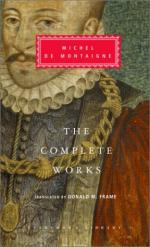|
This section contains 479 words (approx. 2 pages at 400 words per page) |

|
Book 2 of Essays : Chapter 6 Summary and Analysis
During essay #11 Montaigne writes about virtue. He explains that he believes that virtue is more than simple goodness. This "simple goodness" is what occurs when the kindly person goes through life inclined towards further kindness. He differentiates between this and a virtue. To exhibit virtue might be to master a desire for vengeance. He cites a case of someone enraged from being injured - to avenge oneself is the natural instinct. To master this urge and release the feelings without pursuing the revenge to the end would be to exhibit virtue. This, he means, clarifies the difference between the real exercise of virtue and being easy going.
Essay #12 is the longest one in the entire body of writings. This is the Apology for Raymond Sebond. Montaigne begins by explaining that his father liked education; he...
(read more from the Book 2 of Essays : Chapter 6 Summary)
|
This section contains 479 words (approx. 2 pages at 400 words per page) |

|




